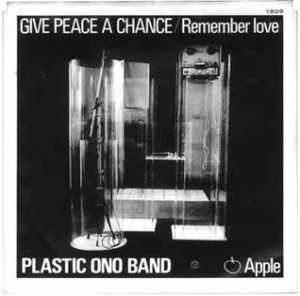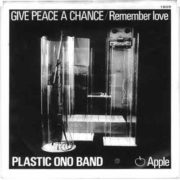Music, International Affairs, And Jimmy Carter’s Dream: Chapter 2
Chapter 2: Paul McCartney’s 24th Birthday, Bertrand Russell, and “Giving Peace A Chance” in Vietnam
 “Beatles press conference in Tokyo, June 29, 1966:
“Beatles press conference in Tokyo, June 29, 1966:
Q: “How much interest do you take in the war that is going on in Vietnam now?”
John Lennon: “Well, we think about it everyday, and we don’t agree with it and we think it’s wrong. That’s how much interest we take. That’s all we can do about it… and say that we don’t like it.”
Just two weeks prior, Paul McCartney had spent part of his 24th birthday visiting famed British mathematician Bertrand Russell at his Chelsea home. After being welcomed in by his American assistant Ralph Schoenman, an antiwar activist, Bertrand Russell spoke to an initially intimidated Paul about the war in Vietnam. Upon returning to the Beatles, Paul explained to the group, and John in particular, about the situation. As they spent some time doing their own “investigating,” such as by talking to American friends in London who were worried about being drafted, they began to form their opinions on the war. When asked about the Vietnam during their Japanese tour though, Lennon responded pessimistically: “we think it’s wrong…that’s all we can do about it…and say that we don’t like it.”
The evolution of John’s activism wasn’t a straight line. For the two years after that interview, the Beatles didn’t speak or sing out consistently specifically against the war. The first song released by the group to touch on the antiwar protests, “Revolution,” in fact criticized the more radical, sometimes violent parts of the anti-Vietnam protests more than the actual war:
if you want destruction, you can count me out
If you go carrying pictures of Chairman Mao
you ain’t gonna make it with anyone anyhow…
he sings. Meanwhile, fellow British rockers the Rolling Stones were releasing songs “Street Fighting Man” that celebrated the uncompromising anger of the protestors. In the music scene in Britain and beyond, John Lennon and the Beatles were far from taking the lead against the Vietnam war.
By 1969, though, shortly after celebrating his wedding with Yoko Ono, John would make a shift. The couple, now hounded by the media searching for a story, had privately decided to use the attention to “advertise” for peace. The trick was to invite the media to “bed-ins” at hotel rooms where the press would be hoping to catch the couple in a more scandalous moment, and instead be treated to songs and conversations about peace in Vietnam. Despite extensive publicity and cultural influence, the war would persist for six more years. On one hand, it seemed that John’s initial belief that all a musician could do is “say that we don’t like it… that’s all we can do about it,” was true. On the other hand, just a few months after debuting “Give Peace A Chance” from their hotel room, folksinger Pete Seeger would use the slogan to lead a half-million person march on Washington to protest the war.
SOURCES:
- https://www.the-paulmccartney-project.com/1966/06/paul-mccartney-meets-with-bertrand-russell/
- https://www.the-paulmccartney-project.com/interview/interview-with-prospect/
- https://www.openculture.com/2012/03/how_bertrand_russell_turned_the_beatles_against_the_vietnam_war.html
- https://www.cheatsheet.com/entertainment/ringo-starr-wished-the-beatles-used-power-good.html/
- https://www.washingtonpost.com/opinions/2022/10/28/peace-movement-language/
- https://faroutmagazine.co.uk/john-lennon-yoko-ono-bed-record-give-peace-chance/
- https://www.culturesonar.com/revolution-the-beatles-speak-out/
- https://faroutmagazine.co.uk/paul-mccartney-explains-why-the-beatles-were-political/
Music, International Affairs, And Jimmy Carter’s Dream: Chapter 2
Chapter 2: Paul McCartney’s 24th Birthday, Bertrand Russell, and “Giving Peace A Chance” in Vietnam













